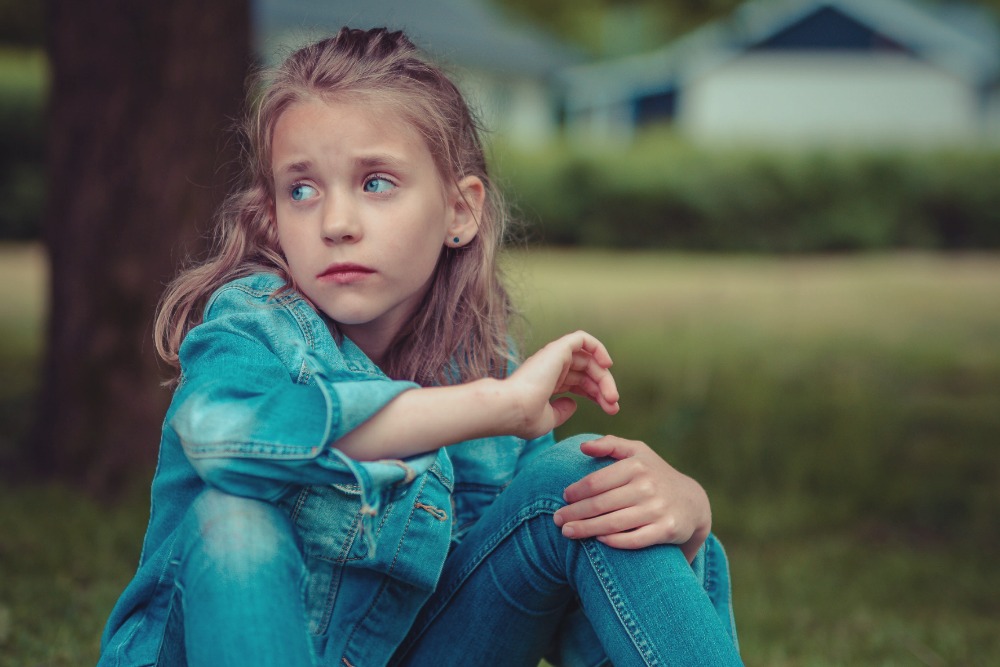Being the parent of an 11- and 13-year-old, I am shocked at the number of families we know that have a parent with a life-threatening illness. When I was growing up, I don’t remember hearing of friends or classmates who had to handle these types of family challenges or stresses.
Just a few years ago, at my children’s school, three mothers in one grade level received breast cancer diagnoses. I know this is not a statistic per se, but the sheer fact that it is now so “common” is harrowing. One of the most frequent questions I get when a diagnosis has been made is, “What can I do as a parent to help and support my child now that my partner is sick?”
There is no simple answer to this question, but there are things you can do to help support your child to stay healthy, secure, and grounded. And no matter what you do or say, you will have to plan for the unexpected. Sometimes there needs to be a plan A, B, C and D! Maintaining routines, asking for help, and honest communication are just three strategies for sustaining a family dealing with a serious or life-threatening illness.
Maintain Routines and Schedules.
Initially after a diagnosis is made, some form of chaos usually follows. This can be part of the process — disruptions in the family schedule are inevitable. However, it can be extremely helpful for children to return to routines that include sleep schedules, meal times, and activities because it re-establishes that sense of stability and security.
You can start by writing out a daily schedule for young children or a weekly calendar for older children. Having a schedule written out will also help those supporting you during this time, such as friends, family and paid childcare providers, to maintain routines when you cannot be the one to carry them out.
In creating your list or calendar, think beyond the places your children need to be, and also include some of the rituals you maintain in your family such as Friday night dinners, movie nights, or yearly trips. Be sure to include these when thinking about your schedules as well, because they help to create a feeling of normalcy.
Ask For Help.
We live in a culture that values independence and self-sufficiency, even if it becomes detrimental to our wellbeing. Because of these cultural values, it may be even more challenging for us to turn to friends, co-workers, school personnel, or even acquaintances to help in managing our children’s lives.
The reality is you probably will not have the time and energy to manage and control the minutiae of your child’s day. Those around you really do want to contribute and show their love for you and your family. Sometimes it requires a re-framing or shifting of the lens to see that by allowing others to help and give, you can be giving a gift, too. The joy you provide others in receiving is equally as valuable as the help they are offering. Additionally, by asking or accepting help, you are modeling this behavior for your children, which communicates to them that they don’t have to manage their thoughts and feelings all on their own.
Be honest and keep communication open.
Talking about the illness and sharing some of the basic facts are very important when communicating with children. There is nothing worse or more anxiety provoking for children than to learn about the truth of their parent’s illness by overhearing it indirectly or from someone else.
If there is uncertainty or lack of a clear path to treatment or outcomes, it may be helpful to slowly introduce the illness by discussing the first steps that will be taken, such as “Daddy is going in for an important surgery.” In addition, unless the outcome is clearly grim, it is important to convey a confidence in the process — to even begin treatment one needs to mobilize all the confidence he can.
Finding the right time to talk with your child would be the first step. Being mindful of when your child is most open to this type of dialogue can be helpful. For young children, bedtime can be one of these moments, while talking in the car or during activities might be more comfortable for older children. The key is to be honest about the facts and your feelings.
Even though it may feel counterintuitive, it can be helpful to show your own emotions. Doing so will help validate some of your children’s own feelings. You can reassure them that you are there to support them and understand their experiences and emotions.
There is no right or wrong way to handle these tough moments in our family lives. Every family and every child has different needs. These three suggestions can be a starting point in helping to preserve a sense of well being in your home. Just as all practices in parenting, there is absolutely no “right way.” There is no place for guilt, either — guilt does not benefit you or your children. The key is to stay connected and communicate, maintain normalcy through rituals and routines, and accept the love your family and community wish to show you.
Would you like to keep these tips handy for yourself or a friend? Download the tips below:
[irp posts=”5701″ name=”Building Social & Emotional Intelligence in Children – How to Teach Connection and Civility (by Melissa Benaroya)”]
[irp posts=”2673″ name=”Helping Kids Navigate Playground Politics (by Melissa Benaroya)”]
About the Author: Melissa Benaroya
 Melissa Benaroya, LICSW, is a Seattle-based parent coach, speaker and author in the Seattle area (MelissaBenaroya.com). She created the Childproof Parenting online course and is the co-founder of GROW Parenting and Mommy Matters, and the co-author of The Childproof Parent. Melissa provides parents with the tools and support they need to raise healthy children and find more joy in parenting. Melissa offers parent coaching and classes and frequently speaks at area schools and businesses. Check out Melissa’s blog for more great tips on common parenting issues and Facebook for the latest news in parent education.
Melissa Benaroya, LICSW, is a Seattle-based parent coach, speaker and author in the Seattle area (MelissaBenaroya.com). She created the Childproof Parenting online course and is the co-founder of GROW Parenting and Mommy Matters, and the co-author of The Childproof Parent. Melissa provides parents with the tools and support they need to raise healthy children and find more joy in parenting. Melissa offers parent coaching and classes and frequently speaks at area schools and businesses. Check out Melissa’s blog for more great tips on common parenting issues and Facebook for the latest news in parent education.





I was such a kid, my mother has a serious genetic illness but when I was a child I didn’t understand anything. I didn’t even hear the proper name of this illness until I was an adult. My mother illness was a taboo in my family and it wasn’t good at all.
I think those advices are really useful and I wish that my parents knew them all in past. This is what I needed.
Actually I have some questions. This illnes is still present in my family so it means that me, my brother, my cousins can get it. We have 50% chance that we already inherited it, but we will know it for sure in older life. But we have a chance to make a genetic test. I wonder – what age is good to let you child know that he or she also can have this illness? This is huge and very scary thing but I don’t believe that hiding this information will be helpful… Is it OK to wait until the person will be a grown up? What do you think about such a situation? Do you have some advices?
my close friend had a similar situation…my friend and her sister decided not to have the test because they live everyday positive thinking they might not have it (motorneurone),they were both early 20s when their mom became ill and slowly lost her in stages to the terrible illness.my friend is now 48 has a good life and most of all is happy . wish you and your family a happy healthy life..try to not worry about what not happen. andrea